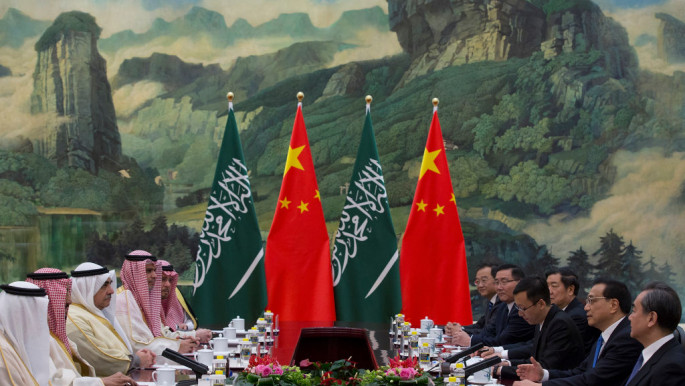
How long can China stay out of Middle East politics?
The world is changing. Three decades ago, it would have been inconceivable to find posters calling out the opportunities to be discovered from trade between the Middle East and China.
It was the West that called - with its freedoms and sophistication, its imperial past a double-edged sword that attracted and repelled in almost equal measure. Europe and the United States have an ambiguous relationship across much of the Arab world, forged over the course of more than a hundred years. Self-interested and duplicitous on the one hand (with a catalogue of failed interventions, poor policy decisions and unfortunate choices of political partners), but also open, tolerant, well-structured and worthy of admiration on the other.
Today, in 2017, there is a new show in town. Across the Arab world, the future seems to lie in the East - and above all with China.
Chinese economic growth over the last three decades has been nothing short of spectacular. According to the World Bank, more than 800m people were lifted from below the poverty line since 1990 in China, while at the same time, GDP has risen from $360bn to nearly $12tn as per capita income rose by 49 times.
 |
Earlier this year, King Salman of Saudi Arabia pointedly undertook a tour not of the US and Europe but of Asia, ending up in Beijing |  |
In 2013, President Xi announced a new project to flex these economic muscles and also use them to prepare for China's long-term future. This initiative, now known as the Belt and Road Initiative (BRI), seeks to engage in a massive investments across infrastructure including energy, transportation and communications not only across Asia, but in Africa and Europe as well.
 |
|
| Chinese Premier Li Keqiang meets with Saudi Arabia's King Salman bin Abdulaziz Al Saud (2nd-R) at Great Hall of the People on March 17, 2017 in Beijing, China [Getty] |
China's appetite has not gone unnoticed in the Gulf States and in Saudi Arabia, as the adverts and posters at airports and along the highways show. It has not gone unnoticed at the very highest levels. Earlier this year, King Salman of Saudi Arabia pointedly undertook a tour not of the US and Europe but of Asia, ending up in Beijing to demonstrate the importance of economic ties between Saudi and China.
These connections lie partly in current levels of trade - valued at around $42 billion last year, a sum that is significant but hardly overwhelming. But there is more to it than that. Saudi Arabia and China, noted the king during his visit to Beijing, share a strategic vision of the world, one where both "promote global and regional peace, security and prosperity".
There are fledgling joint ventures between the two countries too, such as the investments by the Saudi Arabian Industries Corporation (Sabic) in a polycarbonate complex in Tianjin or a substantial stake in the Fujian refinery and petrochemical plant by Aramco - or a series of licenses granted to Chinese companies in Saudi earlier this year that take the number of Chinese businesses investing in the country to nearly one hundred and fifty.
| Read more: China provides $10 billion credit line to Iran | |
This mutual co-operation is being driven, on one level at least, by changes in the way that Saudi and China see the world around them, and also how they see the challenges they both face in coming decades.
 |
There is a natural mirror, in other words, between Saudi Vision 2030 and the Belt and Road Initiative that is China's signature economic and foreign policy |  |
There is a natural mirror, in other words, between Saudi Vision 2030 on the one hand, with its ambitious reform programme, its attempt to streamline the state and to diversify from over-dependence on oil, and the Belt and Road Initiative (BRI) that is China's signature economic and foreign policy. Likewise, the BRI is designed to plan for the future, planning ahead to ensure energy security that is essential to the country's continued growth, and also to make a sweeping series of strategic investments that have long-term goals.
The overlap and the prospect of working together was neatly captured by the Saudi energy minister, Khalid al-Falih in May 2017. "The potential offered by this unique initiative", he said, "is immense and promising".
The problem is that Saudi Arabia is not the only partner that China is keen to engage. While oil imports from Saudi Arabia have long been a significant part of Beijing's energy imports, so too are those from Qatar - currently locked in a diplomatic dispute with Saudi Arabia and the other Gulf States.
 |
China has played an even wider field, hosting Israeli Prime Minister Benjamin Netanyahu just a week after King Salman's visit |  |
China has been careful to build ties with Iran too, playing a major role in the building of Tehran's metro system in the 1990s. Indeed, China has played an even wider field, hosting Israeli Prime Minister Benjamin Netanyahu just a week after King Salman's visit - itself not long before the visit of President Abbas of Palestine.
Through this process, China has tried to stay out of the thorny regional politics of the Middle East, with President Xi affirming his hope that "Palestine and Israel can achieve peace as soon as possible and live and work in peace". The message is clear: The Chinese are in town to do business - not to take sides.
There is logic to this approach, although whether it is sustainable in the long run is more questionable.
China does not have the baggage of the deep, complicated and in many ways unhappy relationship that the US, the UK and other parts of Europe have with the Middle East and Gulf. Starting with a blank page and emphasising the prospects of mutual gains, the benefits of working together and the profits of collaboration is an enviable position.
 |
Navigating the rivalries not only between countries in the region, but between competing factions within them is no easy task |  |
And yet, if only life were so simple as letting money do the talking. Navigating the rivalries not only between countries in the region, but between competing factions within them is no easy task. Keeping everyone happy is even less easy at a time of change and transition.
President Xi is smart and right to stress that Chinese connections with the Islamic world and with the Gulf region go back more than a thousand years - much more. He is right too, to note that relations were commercial, and never military or imperial.
But that might change in years to come. The difference is that the intensification of trade and investment leads to tricky choices. Whether those can be put off forever is one of the key questions of the coming decade.
Peter Frankopan is Professor of Global History at Oxford University. His international bestseller, The Silk Roads: A New History of the World is published by Bloomsbury.
Follow him on Twitter: @peterfrankopan
Opinions expressed in this article remain those of the author and do not necessarily represent those of The New Arab, its editorial board or staff.







 Follow the Middle East's top stories in English at The New Arab on Google News
Follow the Middle East's top stories in English at The New Arab on Google News


